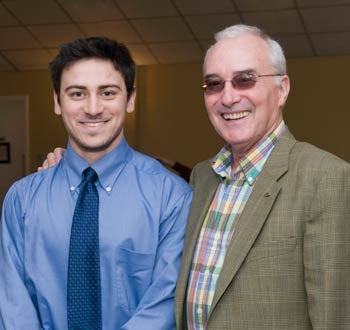 KINGSTON, R.I. –May 5, 2008 —Rather than rent flicks at a local Blockbusters when he was a teen-ager, University of Rhode Island student Kyle Keough remembers hanging out at the Cumberland Public Library, looking for Japanese films, especially those directed by Akira Kurosawa.
KINGSTON, R.I. –May 5, 2008 —Rather than rent flicks at a local Blockbusters when he was a teen-ager, University of Rhode Island student Kyle Keough remembers hanging out at the Cumberland Public Library, looking for Japanese films, especially those directed by Akira Kurosawa.
“My passion was always in film,” the 21-year-old senior says, “but I didn’t consider it a realistic career option until my first film class at URI. After that, I was hooked.”
As soon as URI offered film media as a major two years ago, Keough signed on. He just won the highly competitive President’s Excellence Award in Film Media, which goes to just one top student in each of URI’s departments and programs. He will receive the award May 17 during commencement weekend.
“Kyle has an imagination as sprawling and disciplined as it is inventive and focused,” says John Leo, chair and professor of the Film Media program. “His skills and powers of critical viewing, thinking and writing, have wowed his faculty and peers alike.”
This fall, Keough will attend the University of Iowa, considered one of the premier film schools in the nation. The school also has an internationally acclaimed creative writing program. Keough’s master’s program will give him the option to apply to the doctorate program during his second year.
He is not a filmmaker, nor interested in becoming one. His passion lies in critical theory, the aesthetics of film technologies, and education.
Keough also majored in English at URI, which complements his interest in film. “In high school I was a very good English student and fairly horrid in everything else – my dad’s an English teacher, so I think it’s coded in my genes,” he explains.
Although he’s not a hands-on lights, camera, action guy, he understands the power of film to effect change.
“I was extremely lucky to have a father who got me involved in various outlets with which social change could be achieved. I did a lot of community service growing up: I spent years with TOPSoccer, a national network of soccer teams for the handicapped, and I was involved in the Boy Scouts and am a very proud Eagle Scout. So, a big objective for me in finding an occupation was to find something where I could be a positive influence.
“For me, the moving image is the dominant art form of the 20th century and beyond. It has the capability to inspire and profoundly affect the lives of so many. By critically working with film, I want to promote film for what it is: a vehicle, with which betterment, whether through the self or through a communal experience, can be achieved. I admire filmmakers who use their craft as a tool for advocacy, and I think they do more good than even they may sometimes realize.” He walks his talk. With other students Kyle helped develop a fundraiser for a New Orleans neighborhood rebuilding itself in the wake of Katrina, part of which was the screening of a student-made documentary on potential damages to Rhode Island coastal zones and wetlands from hurricanes.
He’s always been drawn to teaching. “Perhaps it’s the ability to inspire those you teach, but I always knew that I wanted to be an educator at some point. I want to be ‘that professor’ who inspires students to do great things.”
He’s grateful to URI’s Film Media faculty who inspired and encouraged him, particularly John Leo and Rebecca Romanow who served as his honors thesis advisor.
All those hours spent in the Cumberland library when he was a teen were applied to his honors thesis this year. Titled “Cowboys and Shoguns,” his paper dealt with the evolution of the “Western” genre by way of a cross-cultural exchange between the United States and Japan in both pre- and post-WW2 films.
“We consider the Western a purely American cultural product, yet it was, in actuality, the Japanese jidaigeki (or feudal, samurai-type) films that advanced the Western genre immediately following World War II. Famous Western directors, like Arthur Penn (Bonnie & Clyde) and Sam Peckinpah (The Wild Bunch) have said they wanted to make Westerns like [Japanese director] Kurosawa made Westerns.
“I was already a huge Kurosawa fan, but I knew little about Japanese film as a whole. I did a little research last year and realized that this connection had been ignored by scholars for 50 years.”

Interest in film isn’t a family legacy. “Nobody else knows what the heck I’m talking about half the time. I almost feel bad I gave them a copy of my thesis to read,” he says with a grin.
Shown above: Kyle Keough with John Leo, chair and professor of the Film Media program.
URI Department of Communications & Marketing photo by MIchael Salerno Photography

